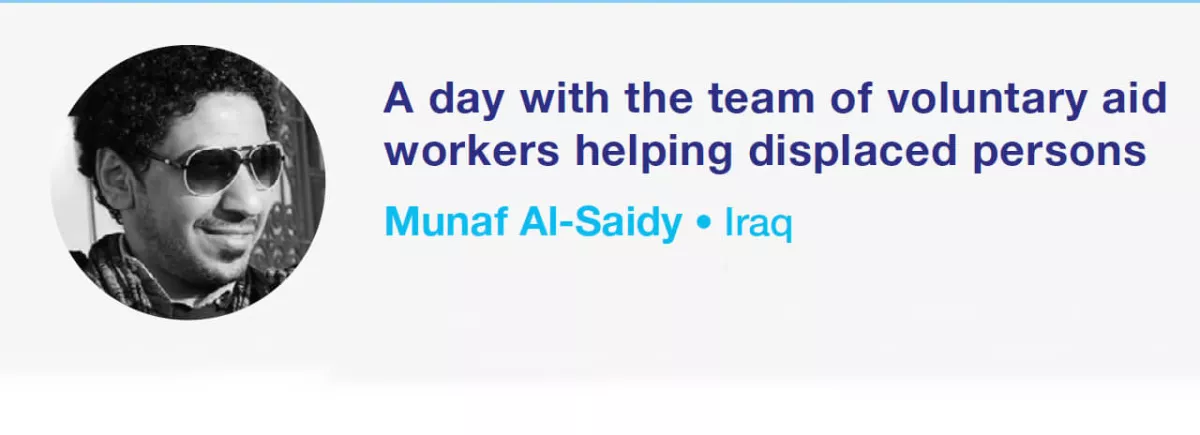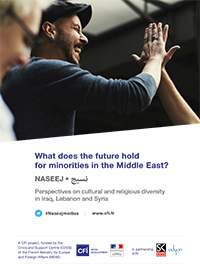
A day with the team of voluntary aid workers helping displaced persons
Related project
NaseejDiscover a selection of the best articles dealing with cultural and religious diversity in the Middle East, entered in the Naseej competition launched by CFI and SKeyes in October 2017.
This week, Iraqi journalist Munaf Al-Saidy describes the daily life of young volunteers in Baghdad and in the region of Mosul.
Published in Urpress on 30/08/2017
It is six o'clock in the morning in Baghdad. Abbas Majed gets dressed quickly. His clothes are scattered all over the room, after returning the night before, exhausted by his work as a volunteer in the city centre. For over three years now, the 26-year old-young man has been involved in voluntary work with several local humanitarian associations and youth groups in Iraq. He believes in the "role of voluntary work in building a civil State that respects human rights".
However, Abbas preferred to join a team of young local volunteers, called "Taawon al Khayri" (literally meaning "charitable collaboration"), which works to help displaced persons and poor families in Iraqi villages. This team of fifteen activists all share the same desire to carry out voluntary work in a country besieged by ethnic and sectarian conflicts. "
We help displaced persons and disadvantaged families locally, to combat the sectarian and racist prejudices that Iraqi society suffers from so much. Our team consists of volunteers from every religion and community in Iraq", says Abbas.
The Taawon al Khayri team that Abbas has recently joined uses their own money to combat sectarianism, racism and corruption to achieve radical changes in this city of over eight million inhabitants. "
That's how we, the war generation, fight for life, by presenting a different image."
[…]
Whilst the Iraqi forces and their allies are fighting against Daesh, Abbas and his team of volunteers are striving to help displaced persons who fled regions that became theatres of military operations, in order to provide for their basic needs: food, clothing and a roof over their heads. Despite the lack of resources and support, the sustainability of their work here relies on donors based in Iraq and in Iraqi communities abroad. The war, which broke out in the summer of 2014, forced about 3.2 million Iraqi people to flee their homes, according to United Nations reports.
Abbas, who is a state employee at one of the country's oil companies, is used to devoting his weekends to voluntary work, he no longer shares his time with his family and no longer carries out any other social commitments.
[…]
"
No-one can erase the suffering that people experienced when fleeing from Daesh. They've faced violence and war, but also learnt to understand a sense of solidarity and union during this difficult ordeal" says Abbas. And he adds: "There are considerable problems that pose an obstacle for us; the media, for example, play a catastrophic role in broadcasting and promulgating the discourse of violence and hatred."
He strides towards the main district to get a taxi to take him to the flea market or maybe to "Chechnya" market, one of the biggest markets in working-class Baghdad, named in reference to the Russian Chechen events in the 1990s. The difference between this market and the capital's other markets is that most of the sellers are poor, they spread their wares on the ground and sell them at very low prices. Customers at this market are also from modest backgrounds. Abbas is going to this market to buy about 40 metres of metal sheeting, which he will use to build roofing for houses. For him, setting out early is synonymous with getting a good deal: he will be able to get the
amount needed at a price he can pay.
[…]
Abbas spent an hour and a half travelling by car to get to his destination. The market was not jam-packed, as usual. Three years of fighting have been enough to create a tragic reality affecting every level. The economic crisis, especially owing to the drop in oil prices, has reached its height and opportunities for work are rare.

Re-establish displaced persons in their regions
Hundreds of kilometres to the North, 29-year-old Alaa Faraj, a volunteer, and his friends in the same Taawon al Khayri team, are busy digging wells for drinking water in one of the regions of Mosul, now liberated from Daesh control, after the destruction of its infrastructure, in particular the drinking water supply networks. The team's mission, however, is still to help re-establish displaced persons in their regions following their liberation. The team of volunteers entered liberated regions, escorted by the security forces, shortly after the departure of Daesh, as at Mosul. "
We've been working for the last three weeks on providing a drinking water supply for the families returning to the city. The situation here is very difficult because the infrastructure has been completely destroyed and the work to rebuild the city requires international effort in order for those who were displaced to be able to return and settle down again."
From time to time, Alaa answers phone calls from his family to reassure them, before adding "
my family doesn't like what I'm doing, they're really worried because of what the press is saying about the security situation here. We've got faith in the fact that our humanitarian work unites us and is eliminating the spirit of sectarianism and racism."
Abbas finds the metal sheeting he needs at a very good price, but the seller needs change because he hasn't yet sold anything. In the poor people's market, it's hard to find change for high denomination notes.
About 30 km away, Mohammad Khattab and his children, who were displaced from the city of Anbar, are waiting for the team of volunteers to finish the roof of their house that very day, so they can protect themselves from the sun's heat. He watches the young people hurrying to move the bricks and set in place the iron posts on which will sit the metal sheets that Abbas is transporting and that the heavy traffic is preventing from arriving.
One of Mohammad's sons stands beside him and squeezes his father's hand to his chest, asking him when the work on the house will be finished and whether they will be able to sleep there tonight. The father looks at his son and tells him the team are working hard for them to be able to sleep in the house as quickly as possible but that they are waiting for the metal sheets to arrive.
In Mosul, Alaa and his team share their lunch with residents who have come back to the city. They take the opportunity to talk to them about the concept of peaceful coexistence and of its role in eradicating sectarianism and in respecting the rights of the city's minorities. "
I prefer to have my lunch in the company of residents who have come back to their city, so as to create a bond of sympathy with them and share our message, which says that strength lies in unity, and this strength is significant", he says, before adding, "our members come from every community and religion fighting
against terrorism. And through our humanitarian work, we are combating fanaticism and hatred and are calling for people to respect the rights of others.
"
Despite the efforts of Alaa and Abbas and both their teams, they are beset with difficulties because of the lack of resources and the scale of the damage caused by the fighting. This damage demands an international effort to deal with it. However, the team does not trust many local public organisations in Mosul and the other liberated towns and cities: "
Since 2003, to date the international organisations have spent considerable sums on development and human rights projects. But this money is stolen by many humanitarian brokers and volunteers, under the cover of humanitarian associations."
Mohammad Khattab takes a long look at the metal roof, standing in the shade of his house, with tears in his eyes. One of the members of the team notices him and slaps him on the shoulder. Mohammad tries to kiss the man's hand, a brown hand, coarsened from transporting the bricks, but the volunteer pulls his hand away and takes him in his arms, saying: "
Don't worry! I wish you much comfort in your new house."
"
These young people are remarkable, they deserve our love and recognition. They have instilled in us the spirit of love and union, and they represent a radiant future for this country. I hope my children will learn dedication, thanks to what these young people are doing, as they are gifted and dedicated in their work", stresses 46-year-old Mohammad Khattab.
Abbas and the other members of the team leave Mohammad Khattab's new house to return home at dusk. On the way, Abbas calls his colleague, a member of Alaa's team, to tell him that Mohammad's family will be sleeping in their new house tonight "
under a firmly attached sheet metal roof".
Find the ten finalists of the
Naseej competition in the What does the future hold for minorities in the Middle East?



